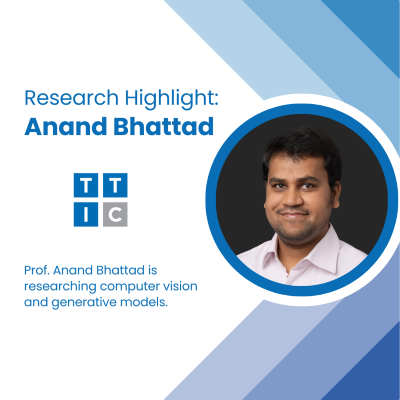
Research Highlight: Anand Bhattad
Professor Anand Bhattad joined the TTIC community in the fall of 2023 as a Research Assistant Professor (RAP). Previously, he had finished his Ph.D. in computer vision at the University of Illinois Urbana-Champaign.
Professor Bhattad’s research centers on computer vision, computer graphics, computational photography, and machine learning. He is currently focusing on generative models to explore the kind of knowledge they capture and their limitations.
“The question I’ve been asking is: how do generative models learn to generate images?” Professor Bhattad said. “Are they learning some abstract representation of the world, or are they learning physical attributes? We showed that generative models learn physical interpretable concepts but don’t quite understand perspective geometry in images. We are continuing to explore emergent latent knowledge, its limitations, and extending these analyses to video models.”
Professor Bhattad has been active on the TTIC campus during his term as an RAP, from leading weekly meetings for the Perception And Learning Systems (PALS) group (ordinarily run by Professor Greg Shakhnarovich, who is currently on sabbatical), organizing a workshop for the IEEE/CVF Conference on Computer Vision and Pattern Recognition (CVPR) 2024, and is part of several research collaboration projects.
“The first time I learned about the RAP position at TTIC was through the Midwest Vision Workshop that was hosted in Chicago,” Professor Bhattad said. “There were many well-known and established computer vision researchers there who had affiliations with TTIC, and my Ph.D. advisor, David Forsyth, encouraged me to apply when I was searching for postdoctoral positions. I felt the flexibility and freedom to focus on research was a good fit for me.”
Professor Bhattad has also taken an interest in teaching and is a course instructor for a special topics course, “Past Meets Present,” at TTIC for the spring 2024 quarter. This graduate seminar course aims to bridge the gap and connect the dots between the surge in deep learning and the foundational work that laid the groundwork.
“It’s interesting and I’ve been enjoying it so far,” Professor Bhattad said. “In every class, we discuss two papers, one historical foundation paper, and one new modern approach paper, and then we try to find the connections between the two and see how historical ideas are still relevant.”
Professor Bhattad received his B.Tech. in Civil Engineering from the National Institute of Technology Karnataka Surathkal. He received his M.S. in Civil Engineering and also an M.S. in Computer Science and Ph.D. in Computer Science from the University of Illinois Urbana-Champaign.
“I became acquainted with computer vision while applying existing algorithms to solve problems in civil engineering,” Professor Bhattad explained. “However, using algorithms developed by others didn’t fully satisfy me; I wanted to create my own. This led me to pursue a Master’s degree in computer science with a focus on computer vision, eventually culminating in a Ph.D. in the field. In retrospect, I was at the right place at the right time.” ”
If there is one piece of advice Professor Bhattad would give to future researchers, it would be to understand the importance of perseverance.
“Especially in research, you will go through many rejections, but if you believe in your ideas things will eventually pan out,” Professor Bhattad said. “If you want to make a mark for yourself, you need to do something different. I think the work one does speaks a lot about who you are and what kind of researcher you are. If you want a successful academic career, you need to find your small niche where you can be an expert.”

